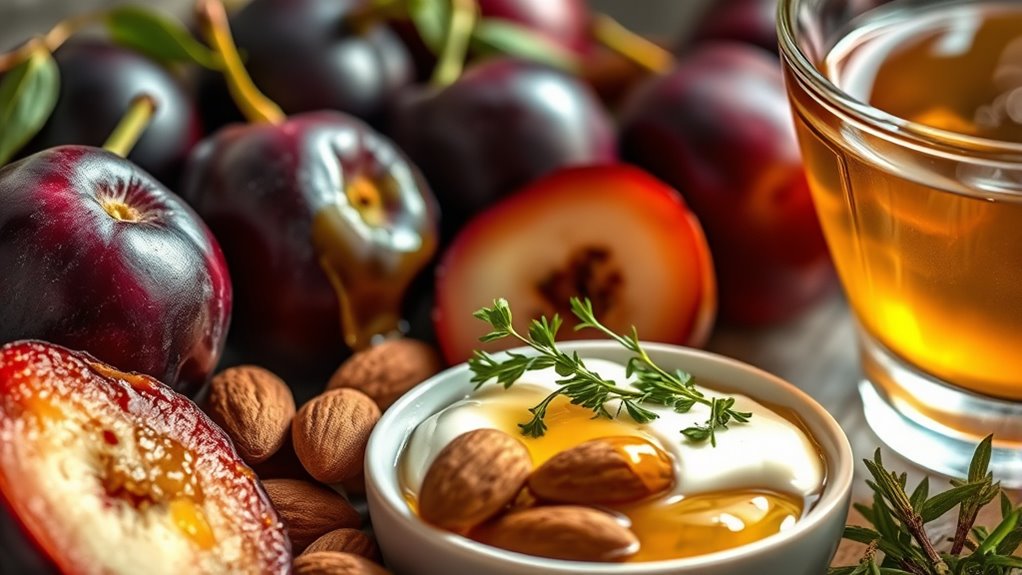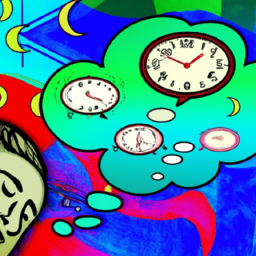To enhance your vivid lucid dreams, focus on eating foods rich in tryptophan like turkey, dairy, nuts, and complex carbs such as sweet potatoes to boost serotonin and melatonin. Incorporate choline-rich foods like eggs and fish to improve dream recall, and enjoy sleep-friendly herbal teas or tart cherries to support restful sleep. Maintain good sleep hygiene and create a calming environment to maximize REM cycles. Keep exploring for more tips to uncover deeper dream experiences.
Key Takeaways
- Consume tryptophan-rich foods like turkey, dairy, and nuts combined with complex carbs such as whole grains to enhance sleep quality and dream vividness.
- Include choline-rich foods like eggs and fish to boost acetylcholine levels, improving dream recall and the likelihood of lucid dreams.
- Incorporate sleep-promoting herbs like chamomile and tart cherries to support sleep onset, stability, and more intense dreaming.
- Maintain good sleep hygiene by avoiding caffeine, alcohol, and screens before bed, creating an environment conducive to vivid, memorable dreams.
- Combine dietary choices with lucid dreaming practices such as dream journaling and reality checks to increase dream vividness and lucidity.

If you want to enhance your chances of experiencing lucid dreams, paying attention to your diet can make a significant difference. The foods you consume before bed can influence your ability to remember dreams, induce vivid imagery, and even aid in dream incubation—where you set intentions to dream about specific topics or scenarios. Additionally, maintaining good sleep hygiene is essential, as disrupted or poor-quality sleep can hinder lucid dreaming efforts. By combining mindful eating habits with proper sleep practices, you create an environment conducive to more vivid and memorable dreams.
Start by focusing on what you eat in the hours leading up to bedtime. Foods rich in tryptophan, such as turkey, dairy, nuts, and seeds, can boost serotonin and melatonin levels, which regulate sleep cycles and promote relaxation. Incorporating complex carbohydrates like whole grains or sweet potatoes helps increase tryptophan’s availability in the brain, supporting restful sleep and potentially enhancing dream vividness. Some individuals also find that consuming small amounts of choline-rich foods, like eggs or fish, can improve dream recall and facilitate lucid dreaming. Choline is a precursor to acetylcholine, a neurotransmitter involved in REM sleep—the stage most associated with vivid dreaming.
Consuming tryptophan-rich foods and complex carbs before bed can boost sleep quality and enhance dream vividness.
Dream incubation techniques work best when your sleep environment and diet support deep, uninterrupted rest. Engaging in dream incubation—setting intentions before sleep—becomes more effective when your sleep hygiene is on point. Maintain a consistent sleep schedule, avoid caffeine and alcohol close to bedtime, and create a relaxing pre-sleep routine. Limiting screen time an hour before bed reduces blue light exposure, which can interfere with melatonin production. A comfortable, dark, and cool sleeping environment also promotes quality sleep, giving your brain the chance to engage fully in REM cycles where vivid dreams occur. Proper sleep hygiene practices can significantly improve your dream recall and vividness.
Certain foods, like tart cherries or herbal teas such as chamomile or valerian root, can further improve sleep quality by promoting relaxation. These aid in falling asleep faster and achieving more stable sleep cycles, giving you a better chance to experience vivid dreams and improve dream recall. Combining these dietary choices with lucid dreaming practices—like keeping a dream journal or performing reality checks—can enhance your overall success rate.
Ultimately, paying attention to your diet and sleep hygiene isn’t just about what you eat, but how it supports your mind and body during sleep. When you optimize these factors, you set the stage for richer, more memorable dreams, making lucid dreaming not only more accessible but also more enjoyable.

NOW Foods Supplements, L-Tryptophan 500 mg, Encourages Positive Mood*, Supports Relaxation*, 120 Veg Capsules
An essential amino acid that is not synthesized by the body and must be obtained by diet or…
As an affiliate, we earn on qualifying purchases.
As an affiliate, we earn on qualifying purchases.
Frequently Asked Questions
Can Certain Foods Trigger Nightmares Instead of Vivid Dreams?
Certain foods can indeed trigger nightmares instead of vivid dreams, especially if you have food sensitivities or emotional triggers. Spicy or greasy foods eaten close to bedtime might upset your stomach or cause discomfort, leading to disturbed sleep and nightmares. Additionally, foods high in sugar or caffeine can overstimulate your mind, increasing the likelihood of unsettling dreams. Pay attention to how different foods affect your sleep to minimize nightmares.
How Long Before Bed Should I Eat for Optimal Lucid Dreaming?
Timing is everything, like the delicate balance of a tightrope walker. To enhance lucid dreaming, you should eat a light meal about 1-2 hours before bed. This allows your digestive system to settle, improving sleep quality and reducing disruptions. Avoid heavy or spicy foods that can disturb your rest. Proper meal timing helps you enter REM sleep more smoothly, increasing your chances of vivid, controlled dreams.
Are There Specific Supplements That Enhance Dream Clarity?
Yes, certain supplements can boost your dream clarity, but you should be cautious about supplement interactions. Melatonin, for example, is popular and works best when taken about 30-60 minutes before bed. Always follow recommended dosage timing and consult a healthcare professional, especially if you’re on other medications. Proper timing and awareness of interactions guarantee you get the most benefit without adverse effects, helping you achieve more vivid, lucid dreams.
Does Hydration Level Affect Dream Vividness?
Ever wonder if hydration impact influences your dreams? Staying well-hydrated can notably boost dream vividness, sharpening your recall and intensity. When you’re dehydrated, your brain struggles to process signals effectively, dulling dream clarity. So, as you prepare for a restful night, keep sipping water—your dreams might just become more vivid and memorable. Don’t underestimate the power of hydration; it’s the secret to revealing richer, more detailed dreams.
Can Vegetarian or Vegan Diets Influence Lucid Dreaming Frequency?
Yes, vegetarian or vegan diets can influence your lucid dreaming frequency. Plant-based diets rich in vitamins, antioxidants, and magnesium may boost your dream recall and promote more vivid dreams. Consuming a variety of fruits, vegetables, and nuts supports brain health, which enhances dream awareness. Additionally, avoiding heavy or processed foods before bed helps prevent disrupted sleep, making it easier to achieve lucid dreams and remember them clearly.

Now Supplements Choline 300 mg, 100 Veg Capsules – Supports Nervous System and Liver Health*, Vegan
Essential Nutrient Support: Choline is an essential water-soluble nutrient that is often categorized as a B vitamin
As an affiliate, we earn on qualifying purchases.
As an affiliate, we earn on qualifying purchases.
Conclusion
By choosing the right foods and adjusting your diet, you hold the brush to paint more vivid, lucid dreams. Imagine your mind as a canvas — nourishing it with the right nutrients turns your dreams into vibrant masterpieces. I once read about someone who added magnesium-rich foods and suddenly started experiencing clearer, more memorable dreams. Small choices, like what you eat before bed, can unlock a world where your subconscious paints the most extraordinary scenes.

Traditional Medicinals Organic Nighty Night Extra Tea With Valerian Root for Relaxation, 16 Tea Bags (Pack of 1)
Herbal sleep support: Nighty Night tea promotes a good night’s rest with valerian root for sleep support
As an affiliate, we earn on qualifying purchases.
As an affiliate, we earn on qualifying purchases.

NEWGO 3D Cooling Sleep Mask, Weighted Cooling Gel Eye Mask for Sleeping, Cold Eye Mask, Hot Cold Therapy Blackout Sleep Mask for Puffiness, Dark Circles, Dry Eyes, Headaches and Stress Relief
3D Design for a Perfect Fit: NEWGO cooling gel eye mask features a unique 3D design that contours…
As an affiliate, we earn on qualifying purchases.
As an affiliate, we earn on qualifying purchases.









